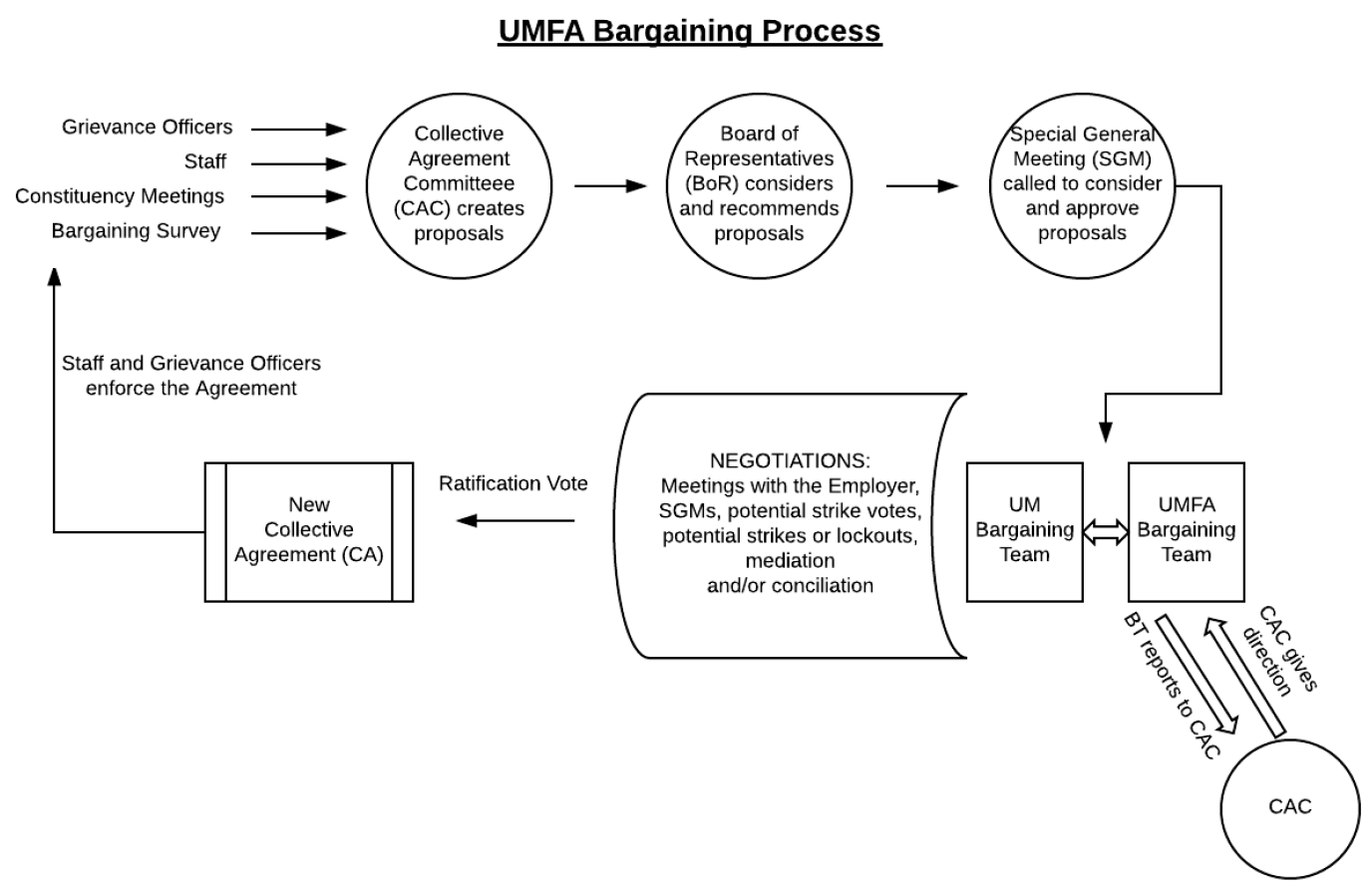Collective bargaining is one of the most important ways we advance our shared goals. Below are some brief explanations of how we do it.
A Brief on Process
Typically, the process begins as soon as a Collective Agreement (CA) is signed: UMFA Staff and Grievance Officers keep track of various issues that arise as the new Agreement is put to use. These issues, along with those raised at constituency meetings, are discussed by the Collective Agreement Committee (CAC). The CAC combines all this information with data gathered through a bargaining survey to create bargaining proposals. Those proposals are then debated by the Board of Representatives, which recommends the proposals to Members, who further debate them at a General Meeting.
With proposals discussed and approved, the Bargaining Team then presents them to the Employer. The Employer also presents their proposals. As negotiations unfold, the Bargaining Team (BT) reports back to the CAC, which debates possible changes to proposals and gives the BT direction on what to communicate to the Employer.
Depending on what happens at the bargaining table, the Executive organizes further constituency meetings, General Meetings, a strike vote, and marches, rallies, and other actions that support the Bargaining Team in their efforts. Once a tentative agreement is reached, the Executive also organizes a ratification vote. If Members think the deal is acceptable, a ‘yes’ vote turns the tentative deal into a new Collective Agreement.

Who Runs the Process?
Bargaining is nothing if not a collective effort. The Bargaining Team (BT) is one of the most visible bodies that partakes in the bargaining process, and is made up of a number of Members (five this time), each appointed by UMFA’s Board of Representatives. UMFA’s legal staff are also on the BT. The Bargaining Team presents proposals to the Employer and reports to the Collective Agreement Committee on the day-to-day goings-on of bargaining.
While at the bargaining table, the BT can be joined by up to 45 Members observing how negotiations unfold. This enables Members to experience bargaining first hand, and report to their colleagues what they saw and heard.
While the Collective Agreement Committee (CAC) isn’t as visible as the Executive Council or the Bargaining Team, it plays an important role in the process: Composed of the Executive, the BT, and other UMFA Members appointed by the Board of Representatives, it solicits information from Members, formulates proposals, and develops bargaining strategy. Staff’s expertise and advice are also sought. The Bargaining Team reports back to the CAC regularly during bargaining, and the CAC modifies proposals and strategy as negotiations develop.
During, and even before, bargaining, The Executive Council (Exec) is responsible for developing timelines and ensuring that they’re met, preparing and releasing communications to the Membership and the media (with the help of staff and the Organizing and Communications Committee), liaising with other unions and the labour movement, and anything else that needs to be done. It’s composed of a President and Vice President elected by the UMFA Membership, the immediate Past President, the Executive Director, and five to seven Members appointed by the Board of Reps on the recommendation of the President.
UMFA’s Board of Representatives (the Board, or BoR) is made up of elected representatives from all over the UM. They are responsible for organizing constituency meetings and communicating with their colleagues about bargaining and sharing that information with the Board and the Executive. Board reps are an important link between the BT, Exec, the CAC, and the Membership as a whole, and have a hand in mobilization, among other things.
The Organizing and Communications Committee (OCC) helps develop internal and external communications, plans social and educational events, and builds member engagement and involvement in the bargaining process. It also invites interested Members to join in on its work.
However, the highest decision making body at UMFA is a General Meeting, constituted when all Members of UMFA are called to discuss specific topics. In the context of collective bargaining, Special General Meetings (SGMs) are called to discuss proposals, overall strategy, and strike votes. It’s also at a Special General Meeting that a tentative deal is discussed, and a ratification vote taken.
Together, these various bodies make the bargaining process what it is: a dialogue between Members about what the workplace should look like and how to make it a reality.
We Make U of M Happen!
